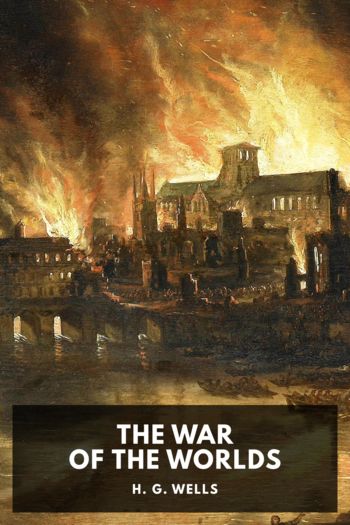The War of the Worlds, H. G. Wells [book series to read .TXT] 📗

- Author: H. G. Wells
Book online «The War of the Worlds, H. G. Wells [book series to read .TXT] 📗». Author H. G. Wells
At Putney, as I afterwards saw, the bridge was almost lost in a tangle of this weed, and at Richmond, too, the Thames water poured in a broad and shallow stream across the meadows of Hampton and Twickenham. As the water spread the weed followed them, until the ruined villas of the Thames valley were for a time lost in this red swamp, whose margin I explored, and much of the desolation the Martians had caused was concealed.
In the end the red weed succumbed almost as quickly as it had spread. A cankering disease, due, it is believed, to the action of certain bacteria, presently seized upon it. Now by the action of natural selection, all terrestrial plants have acquired a resisting power against bacterial diseases—they never succumb without a severe struggle, but the red weed rotted like a thing already dead. The fronds became bleached, and then shrivelled and brittle. They broke off at the least touch, and the waters that had stimulated their early growth carried their last vestiges out to sea.
My first act on coming to this water was, of course, to slake my thirst. I drank a great deal of it and, moved by an impulse, gnawed some fronds of red weed; but they were watery, and had a sickly, metallic taste. I found the water was sufficiently shallow for me to wade securely, although the red weed impeded my feet a little; but the flood evidently got deeper towards the river, and I turned back to Mortlake. I managed to make out the road by means of occasional ruins of its villas and fences and lamps, and so presently I got out of this spate and made my way to the hill going up towards Roehampton and came out on Putney Common.
Here the scenery changed from the strange and unfamiliar to the wreckage of the familiar: patches of ground exhibited the devastation of a cyclone, and in a few score yards I would come upon perfectly undisturbed spaces, houses with their blinds trimly drawn and doors closed, as if they had been left for a day by the owners, or as if their inhabitants slept within. The red weed was less abundant; the tall trees along the lane were free from the red creeper. I hunted for food among the trees, finding nothing, and I also raided a couple of silent houses, but they had already been broken into and ransacked. I rested for the remainder of the daylight in a shrubbery, being, in my enfeebled condition, too fatigued to push on.
All this time I saw no human beings, and no signs of the Martians. I encountered a couple of hungry-looking dogs, but both hurried circuitously away from the advances I made them. Near Roehampton I had seen two human skeletons—not bodies, but skeletons, picked clean—and in the wood by me I found the crushed and scattered bones of several cats and rabbits and the skull of a sheep. But though I gnawed parts of these in my mouth, there was nothing to be got from them.
After sunset I struggled on along the road towards Putney, where I think the Heat-Ray must have been used for some reason. And in the garden beyond Roehampton I got a quantity of immature potatoes, sufficient to stay my hunger. From this garden one looked down upon Putney and the river. The aspect of the place in the dusk was singularly desolate: blackened trees, blackened, desolate ruins, and down the hill the sheets of the flooded river, red-tinged with the weed. And over all—silence. It filled me with indescribable terror to think how swiftly that desolating change had come.
For a time I believed that mankind had been swept out of existence, and that I stood there alone, the last man left alive. Hard by the top of Putney Hill I came upon another skeleton, with the arms dislocated and removed several yards from the rest of the body. As I proceeded I became more and more convinced that the extermination of mankind was, save for such stragglers as myself, already accomplished in this part of the world. The Martians, I thought, had gone on and left the country desolated, seeking food elsewhere. Perhaps even now they were destroying Berlin or Paris, or it might be they had gone northward.
VII The Man on Putney HillI spent that night in the inn that stands at the top of Putney Hill, sleeping in a made bed for the first time since my flight to Leatherhead. I will not tell the needless trouble I had breaking into that house—afterwards I found the front door was on the latch—nor how I ransacked every room for food, until just on the verge of despair, in what seemed to me to be a servant’s bedroom, I found a rat-gnawed crust and two tins of pineapple. The place had been already searched and emptied. In the bar I afterwards found some biscuits and sandwiches that had been overlooked. The latter I could not eat, they were too rotten, but the former not only stayed my hunger, but filled my pockets. I lit no lamps, fearing some Martian might come beating that part of London for food in the night. Before I went to bed I had an interval of restlessness, and prowled from window





Comments (0)